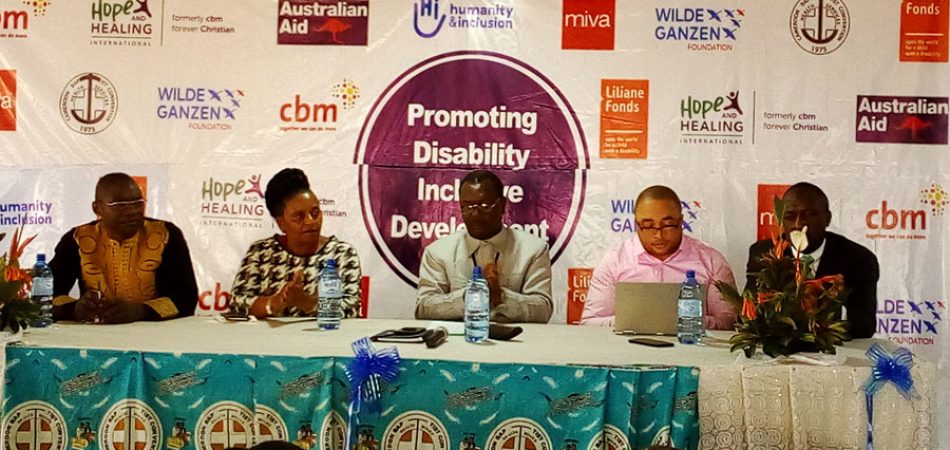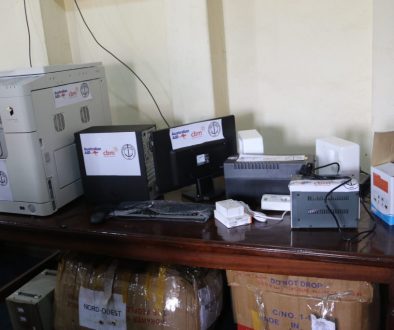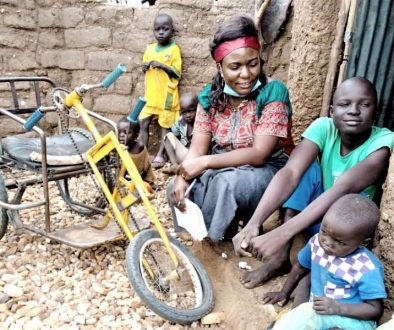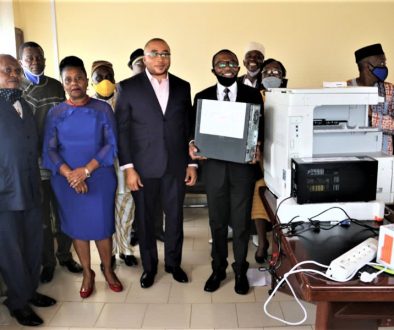Mainstreaming Disability in Development: CBC Health Services moves from Service Provision to Strengthening Systems
The Cameroon Baptist Convention (CBC) Health Services through her disability programs has renewed its resolve in improving the lot of Persons with Disabilities (PWDs) and promoting disability-inclusive development at all levels in Cameroon. This resolve was taken last February 14, 2020 during the launching of the 4th and 3rd Phase of the Socio-Economic Empowerment of Persons with Disabilities (SEEPD) Program, and the Cameroon Clubfoot Care Project (CCP) respectively.
Mr. Awah Jacques Chirac, SEEPD Program Manager says the 4th Phase of the Program, which runs 2020-2022 entitled, “Enhancing Capacities and Participation of Persons with Disabilities: Building Communities for Everyone,” will contribute in improving the quality of life of PWDs.
“In this phase of the program, we will draw gains from previous phases and focus on promoting disability inclusion in practice in mainstream development. We will also step up accessibility to humanitarian and social services for PWDs,” he said.
For 3-years that SEEPD phase 4 will last, the following key results will serve as a measuring rod; ensure that local Councils are increasingly including people with disabilities in Council activities and development, improve access to inclusive health, education, ensure that Disabled People Organizations (DPOs) are leading advocacy efforts, and improve quality program implementation for PWDs at all levels.

According to Prof. Tih Pius Muffih, Director of Health Services, the SEEPD program saw the light of day in 2009 and has for over 10-years running made remarkable achievements in developing medical services to prevent, treat and rehabilitate disabilities, develop good practices in inclusive education, introduce an inclusive micro-finance for PWDs and marginalized groups and more importantly created safe spaces where PWDs can make their voices heard, thanks to support from her strategic partner, the Christian Blind Mission (CBM).
A survey carried out in 2014 showed that the Northwest Region alone has a disability burden of 10-percent (%) representing about 210,000 people with mild to severe disabilities. The situation has further worsened in the advent of the ongoing socio-political crisis rocking Cameroon’s Northwest and Southwest Regions. Conjecturing from this burden in a single region, it is very clear that an organization like the CBC Health Services cannot singlehandedly shoulder the challenge of disabilities.
It is against this backdrop that the CBC Health Services via the SEEPD Phase 4 is shifting from service-provision to strengthening mainstream systems to adopt inclusion as a core part of their mandate.
Speaking at the launching of SEEPD Phase 4 and the Cameroon Clubfoot Care Project (CCCP) Phase 3, Mr. Fon Julius Niba, CBM Country Director said CBM is committed to improving the quality of life of PWDs in poorest communities of the world irrespective of race, gender or religious belief. He noted that the Socio-Economic Empowerment Persons with Disabilities (SEEPD) program is the right platform par excellence for community-based inclusive development.
“Since 2009 this program received over five million euros (3,279,784,999 FCFA), thanks to which it has extended health services through outreach clinics to over 350,000 people in 300 villages in Cameroon’s Northwest Region,” he revealed. The 4th phase of the program being launched amounts to about a billion FCFA.
In line with the prevention of disabilities resulting from clubfoot, Dr. Ndasi Henry, CCCP Clinical Supervisor said the 3rd Phase of the Project will focus on reducing the incidence of mobility impairment caused by clubfoot as well as improve social inclusion. “We will in this phase work to ensure that the treatment of clubfoot is integrated into the public health system in Cameroon, canvas for the participation and uptake of services by families and communities as well as improve on the monitoring, control, and reporting of interventions undertaken in clubfoot clinics,” he said.
Dr. Ndasi equally revealed that they will leave nothing to chance in supporting clinics and medical institutions in the country to have their personnel trained on the Ponseti Technique in correcting clubfoot. The Ponseti technique, according to the Orthopedist, remains the cheapest, affordable and flexible method in treating clubfoot. “The method needs no special room, and takes only 3-weeks training for health personnel to effectively carry out the procedure,” assured Dr. Ndasi.
The program launching presented an opportunity for media partners from the print and audio-visual to be informed on the ideals of the CBC Health Services’ disability programs so that they will, in turn, use their airspaces and media vehicles to inform their audience on promoting disability-friendly world. By and large, mainstreaming disability in development ought to and should be everyone’s responsibility.
SEEPD Donates to SAJOCAH Bafut
On the sidelines of the launching of Phase 4 of the Socio Economic Empowerment of Persons with Disabilities (SEEPD) was a donation of braille items to the St. Joseph Children and Adult Home (SAJOCAH) Bafut. Sister Jick Geraldine, Head of Physiotherapy Unit at SAJOCAH received the gifts on behalf of her organization.

Handing over the braille items, Mr. Warri Denis, CBC Health Services Chief of Administration and Finance (CAF) thanked the donor, Barbara Johnson, a seasoned braille teacher, herself blind for thinking of those who are visually impaired in Cameroon. The CAF called on SAJOCAH to make judicious use of the donated items that included: 10 braille type writers and ribbons and 15 mobility canes.
Mr. Kenchi Joseph, CBR Supervisor while coordinating the brief program added that Barbara Johnson volunteered with the CBC Inclusive School and Braille Center Kumbo from 2015-2018. She did this donation to support learners with visual impairments in special centers in Kumbo, Bafut and Mbengwi.



